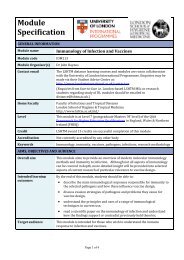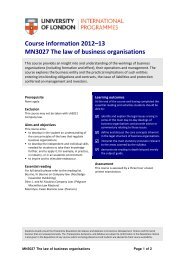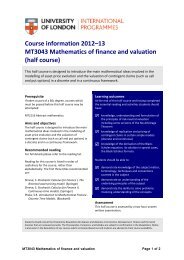Principles of sociology - University of London International ...
Principles of sociology - University of London International ...
Principles of sociology - University of London International ...
You also want an ePaper? Increase the reach of your titles
YUMPU automatically turns print PDFs into web optimized ePapers that Google loves.
21 <strong>Principles</strong> <strong>of</strong> <strong>sociology</strong><br />
30<br />
In short, even the ideas we have about ourselves as individual people<br />
– such as whether we think we are intelligent or stupid, attractive or<br />
unattractive, fat or thin, outgoing or shy – arise from social relationships<br />
and socially accepted norms and standards. When we think about what we<br />
are, we compare ourselves with these social norms. How do we match up?<br />
We also monitor other people’s reactions to us in daily life. How do others<br />
see us? This in turn may influence our behaviour in all sorts <strong>of</strong> ways. For<br />
example, we may try to make ourselves more clever, more assertive, or<br />
more sociable and outgoing. Or we may go the other way and accept that<br />
we can never be any <strong>of</strong> these things and adjust our behaviour accordingly,<br />
perhaps by not working in class, or not trying to make friends.<br />
Activity 1.9 Personal identity<br />
Look at your list. Did you put in any <strong>of</strong> these more personal characteristics?<br />
• If so, ask yourself why you think you have developed this view <strong>of</strong> yourself.<br />
• What do you think have been some <strong>of</strong> the most important influences on the way<br />
you see yourself?<br />
• Are there any particular incidents that stand out as being particularly important?<br />
• Also ask yourself how much the social expectations and the reactions <strong>of</strong> other<br />
people influence your behaviour.<br />
Summary<br />
Here we have asked you to describe yourself as a person and illustrated<br />
just how much <strong>of</strong> ‘yourself’, your ethnicity, gender, occupation and<br />
personal qualities are influenced by the society in which you live. For<br />
sociologists, individuals and societies are inseparable. You cannot<br />
understand one without the other.<br />
Further reading<br />
Berger (1963) Chapter 5.<br />
1.7 Socialisation and identity<br />
The previous section illustrated just how much your life as an individual<br />
is bound up with the social contexts in which you live. In this section we<br />
shall introduce some sociological concepts, and theories that help describe<br />
and explain this process further.<br />
Socialisation<br />
We observed in the last section that a key sociological problem is the<br />
relation between the individual and society. But how does this arise?<br />
In very general terms, we are all born into societies where there are<br />
already established patterns <strong>of</strong> organised behaviour that we referred to<br />
earlier as social institutions, such as speaking a particular language<br />
or organising ourselves into small groups called families. Sociologists use<br />
the term institutionalisation to describe the processes whereby these<br />
social practices become accepted ways <strong>of</strong> doing things in a society or social<br />
group. These social practices, and the values and beliefs surrounding<br />
them, make up the culture <strong>of</strong> a society, or sub-culture <strong>of</strong> a social group<br />
and, as we saw in the previous section, these cultural practices and values<br />
place expectations on how people should behave.
















